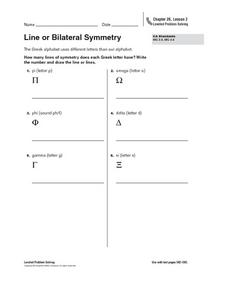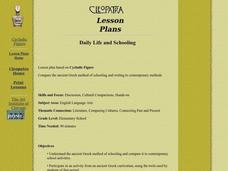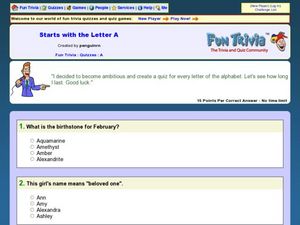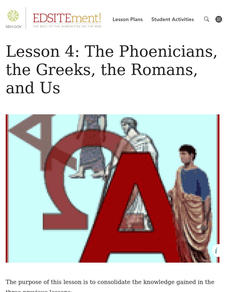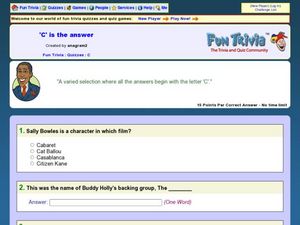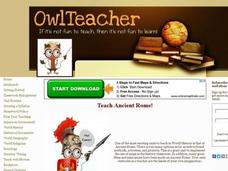Chapman University
Scientific Alphabet Chart - Get to Know Your Greek Alphabet
Greek alphabet letters are used to represent words or values in science and math. Keep a list on hand to refer to while working through calculus or physics problems.
Curated OER
The Greek Alphabet
If you're teaching the Greek alphabet, this worksheet provides the word for each letter, the modern version of the letter, and blanks to complete with the upper and lower case version in Greek.
National Endowment for the Humanities
The Greek Alphabet: More Familiar Than You Think!
In this Greek alphabet lesson, pupils explore the Phoenician origins to the Greek alphabet. Learners compare Greek letters to current letters and write a paragraph about the life of students in ancient Greece. They also identify...
Curated OER
Line or Bilateral Symmetry
In this problem solving worksheet, 4th graders figure out how many lines of symmetry 6 Greek alphabet letters have. Students write each number and draw the line or lines on the lines provided.
Curated OER
The Olympic Medal: It's All Greek to Us!
Students view a graphic of the Athens of 2004 Olympic medal. They discuss the symbols on the medal. Students view the "Greek Alphabet animation" and name the letters in the two Greek words on the medal, They transcribe Greek text by...
Curated OER
Daily Life and Schooling
Students compare the ancient Greek method of schooling and writing to contemporary methods and learn the Greek alphabet on wax tablets.
Curated OER
Starts with the Letter A
Warm up your learners' minds with this short quiz about words that begin with the letter a. There are a total of 10 multiple-choice questions. This is a great worksheet to use prior to a language arts lesson! Note: You can...
National Endowment for the Humanities
Lesson 4: The Phoenicians, the Greeks, the Romans, and Us
Learners review knowledge gained in the three-part unit on the history of the alphabet. Using maps and images, learners consolidate their understanding of ancient Greece, the Romans and the Phoenicians, and their respective impacts...
Curated OER
The Alphabet is Historic: The Roman Alphabet is our Alphabet
Students show that the Greeks, Phoenicians and Romans lived in the Mediterranean area. They give reasons why the alphabet was important for the Romans. and say that the Romans developed the alphabet they are learning in school.
Curated OER
BINGO with Greek and Latin Roots: Unit 1 Narrative Writing
Play BINGO! Reinforce knowledge of word roots with an adaptation of this classic board game. The teacher draws a root word from a bag and learners fill in a square with a word that has the same root base. Instructions and Bingo cards are...
Curated OER
The Alphabet is Historic
Students describe how the Phoenicians, Greeks and Romans passed down the alphabet through the generations. They compare and contrast the letters from early alphabets to the one of today and discuss how they are different. Using a map,...
Curated OER
Ancient Refuge in the Holy Land - International Phonetic Alphabet
Pupils research the uses and symbols of the International Phonetic Alphabet. They complete a worksheet to translate and transcribe phrases of English into the International Phonetic Alphabet.
Curated OER
Prefixes Aplenty
Introduce several new prefixes to your vocabulary lesson. After alphabetizing 19 prefixes, including pro-, geo-, and thermo, third graders use a dictionary to find one word that begins with each prefix. Extend the activity by having...
Curated OER
The Great Alphabet Challenge
In this writing sentences activity worksheet, student practice their language skills as they craft groups of sentences in which first letter of each word starts with successive letters of the alphabet. Three examples are provided.
Curated OER
Cracking Codes and Ciphers
Students explore different codes and ciphers including Morse Code, Egyptian Hieroglyphs, and the Alphabet. They discuss how and why codes are used. Students create their own code and message to exchange with classmates.
Curated OER
'C' is the Answer
Use the internet to enhance the research skills of your High schoolers. In this resource, all sorts of questions are posed: everything from questions about famous people, inventions, entertainment, to important dates in history. There...
Curated OER
Next up: A neat "N" Quiz
Challenge your high schoolers' research skills by having them use the Internet to find the answers to the trivia questions in this on-line worksheet. Answers all begin with the letter "N." All sorts of questions are posed: everything...
Curated OER
Apulian Oinochoe
Students analyze Greek vase painting and create their own vase art. In this vase painting lesson, students analyze the design element shape and the relationship between figure and ground. Students design a figure/ground relationship...
Curated OER
Scratch, Glue, Foil & Paint
Students sculpt large Greek and Roman letter design motifs, and replicate other examples of Greek and Roman artwork.
Curated OER
Science Hits Activity
Students listen to a song that teaches the elements of the periodic table and write their own song to be used as an aid in remembering scientific information.
Curated OER
Pi Day
In this Pi Day worksheet, students complete activities such as reading a passage, phrase matching, fill in the blanks, correct words, multiple choice, spelling sequencing, scrambled sentences, asking questions, take a survey, and...
Curated OER
Friday the 13th
For this algebra worksheet, students rewrite words into algebra and algebra in to words. They write out Roman Numeral and scientific notations. There are 13 questions with an answer key.
Owl Teacher
Teach Ancient Rome!
Teaching the class about Ancient Rome can be fun for you and for them! Check out this incredible resource that has everything you need to bring ancient Roman civilization back to life. Begin by scrolling to the bottom of the page and...
Curated OER
Word Roots 2: Fin, Sed, Fer Intermediate-Word Search
Make learning Latin roots a game! After you have introduced the roots fin, sed, and fer, learners can use this word search to build their vocabulary. (Within the word search are words containing these roots.) You can further the activity...





